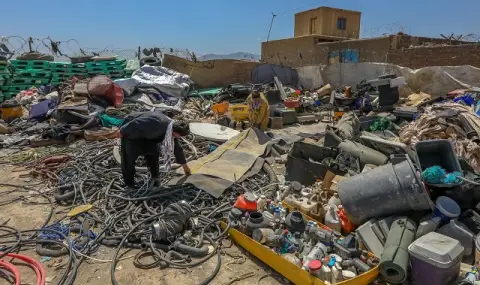Tensions between India and Pakistan increased on Monday after Delhi launched a diplomatic offensive against Islamabad, blaming it for a deadly attack in Kashmir. The attack, which killed at least 26 people, belied Indian authorities' claims that the disputed region, which has seen decades of bloody insurgency against Indian rule, is now peaceful.
The unusual attack on civilians, mostly tourists, who were walking in a scenic area at the time, shocked and angered India and prompted calls for action against India's arch-enemy, Pakistan. The Indian mission has not publicly presented any evidence linking the neighboring country to the attack, but has said there are "cross-border" links with Pakistan. Islamabad has denied any involvement in the attack, which was claimed by a previously unknown armed group calling itself the "Kashmir Resistance."
India and Pakistan rule parts of Kashmir, but both countries claim the entire territory. Delhi describes all activities by armed groups in Kashmir as terrorism backed by Pakistan. Islamabad denies this, and many Muslims in Kashmir believe the militants are part of a homegrown freedom struggle.
The killings have put pressure on Prime Minister Narendra Modi's Hindu nationalist government to respond aggressively. The Indian cabinet has announced a series of diplomatic moves against Islamabad, while hinting that it is planning more sanctions.
Pakistan reacted angrily, insisting it had nothing to do with the attack and saying it would convene the National Security Council today to decide how to respond to India's actions. The council is the highest decision-making forum and includes senior civilian and military officials.
Dozens of demonstrators in Islamabad and other Pakistani cities gathered to protest India's termination of a water-sharing treaty and demanded that the government take retaliatory measures.
"India has taken irresponsible steps and leveled accusations," Pakistani Foreign Minister Ishaq Dar told local television channel "Dunya News". Dar added that "any step by India will lead to a response" from Pakistan. It revived memories of February 2019, when a suicide car bombing in Kashmir brought the two countries to the brink of war.
Modi overturned the status quo in Kashmir in August 2019, when his government revoked the territory's semi-autonomous status and placed it under direct federal control. That deepened tensions in the region, but relations with Pakistan have remained stable. In 2021, the two countries renewed a previous ceasefire agreement along their border, and it has generally been respected despite attacks on Indian forces by rebels in Kashmir. The latest incident has reignited fears of conflict between the two nuclear-armed neighbors who have long accused each other of supporting destabilizing forces.
Modi told a rally today that "India will identify, track down and punish all terrorists - both their leaders and their supporters". "We will chase them to the ends of the earth", Modi warned. The Indian prime minister is expected to convene a meeting later today, attended by representatives of all parties, to present to them information on the government's response to the attack.
India's foreign secretary Vikram Misri said last night that a number of Pakistani diplomats had been asked to leave Delhi and that Indian diplomats had been recalled from Pakistan. Diplomatic missions in both countries will reduce their staff from 55 to 30 from May 1. In addition, the only functioning land border crossing between the two countries will be closed.
India also suspended the famous water-sharing treaty, which remains in force after two Indo-Pakistani wars - in 1965 and 1971, as well as after a major border clash in 1999. The Indus Water Treaty, brokered in 1960 by the World Bank, allows for the sharing of water resources from a river system that is vital to both countries but crucial to Pakistani agriculture.
Some experts say India could go beyond diplomatic sanctions, and some Indian media and leaders from Modi's party are calling for military action.
Defense Minister Rajnath Singh vowed to "pursue not only the perpetrators of the attack but also the conspirators behind this heinous act on Indian soil," Singh hinted at the possibility of military strikes.
Ashok Malik, a former political adviser to the Indian Foreign Ministry, said Delhi's response would be an expression of the government's deep anger and that India's actions on the Indus Waters Treaty "will cost Pakistan's economy dearly." "Islamabad will have to deal with the consequences," Malik said. Indian leaders, he said, see military action as a viable option. "(India's) military strategists believe there is a possibility of conventional action under the nuclear umbrella. "The options are not endless, but they are not insignificant," Malik said.
Praveen Donty, a senior analyst at the International Crisis Group, said that portraying the Kashmir conflict as a Pakistan-instigated security crisis "that can only be resolved through lively talks and vigorous action" has paid political dividends for the Modi government. But that may leave the prime minister with few options in times of crisis.
"There is enormous public pressure on the Modi government to take decisive action and respond militarily. Soon, there will be no other option unless Delhi starts looking at ways to address the roots of the political unrest in Kashmir," Donty said. The killings have shocked residents of Kashmir, where militants fighting against Indian rule have rarely attacked tourists. The attacks have so far been mostly against Indian forces.
Kashmiris have expressed their outrage, which is not something they see often. After many locals were subjected to repression by Indian forces and the central government in Delhi, they took to the streets in protests and torchlight processions against the killings.
Due to the uneasy atmosphere and people's concerns that the attacks could scare away tourists and harm the local economy, markets, private schools and businesses were closed yesterday. Several of the victims of the attack were also buried yesterday.
Translation from English: Nikolay Velev, BTA
